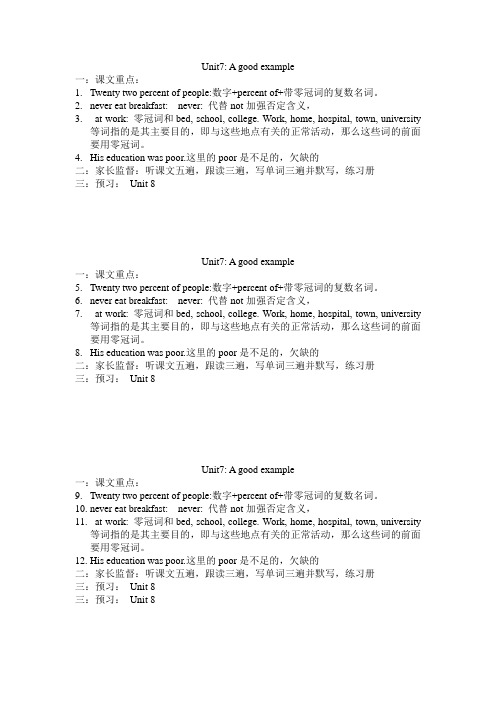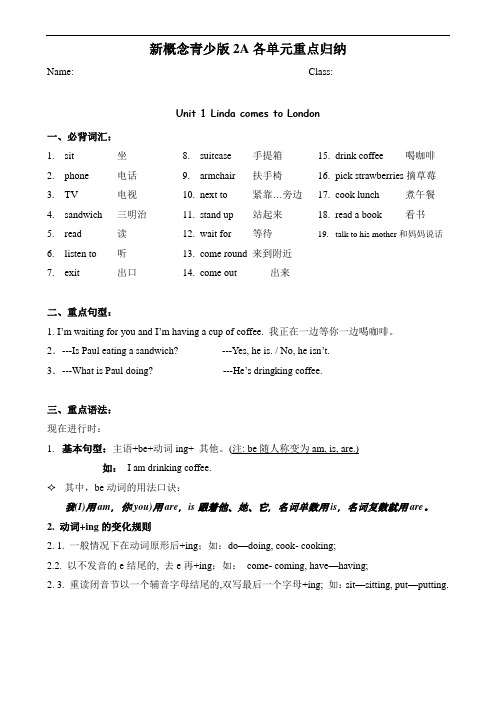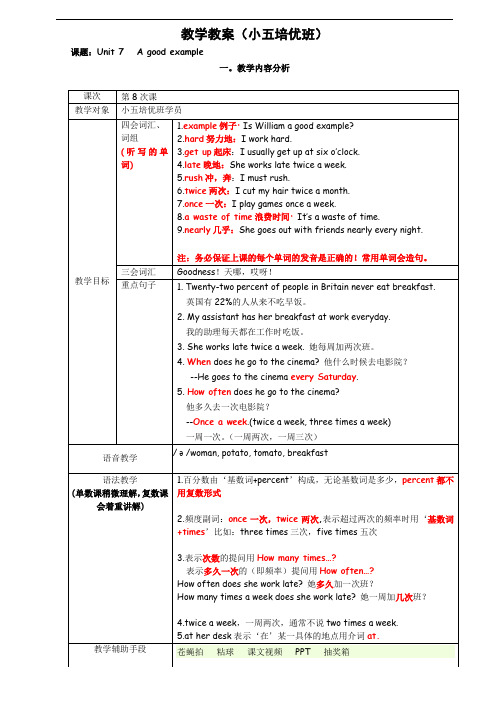2AUnit7__A_good_example
2AUnit7__A_good_example

•
at work every day.
•
It’s a waste of time,
•
really.
• Karen: Poor girl!
•
She works very
hard.
Notes on the text
• a waste of time 浪费时间
• It’s a waste of time doing sth 浪费时间做某事
life model 生活中的榜样
example hard nearly get up
rush
例子 努力地 几乎,差不多 起床 冲
两次 twice 一次 once
晚地 late 天哪,哎呀!
Goodness 浪费时间
a waste of time
Questions
What are they talking about?
work.’
Notes on the text
• Twenty-two percent of people—数字 +percent of+带零冠词的复数名词,表示 百分之多少
• never,频度副词,代替not加强否定含义 ,通常放在助动词后面,主要动词前面。
What’s the difference between job and work?
No, she doesn’t.
2. Does she work late twice a week or three times a week?
She works late twice a week.
Questions
3. How many people in Britain eat breakfast at work?
新概念英语青少版2A7

Unit7: A good example一:课文重点:1.Twenty two percent of people:数字+percent of+带零冠词的复数名词。
2.never eat breakfast: never: 代替not加强否定含义,3.at work: 零冠词和bed, school, college. Work, home, hospital, town, university等词指的是其主要目的,即与这些地点有关的正常活动,那么这些词的前面要用零冠词。
4.His education was poor.这里的poor是不足的,欠缺的二:家长监督:听课文五遍,跟读三遍,写单词三遍并默写,练习册三:预习:Unit 8Unit7: A good example一:课文重点:5.Twenty two percent of people:数字+percent of+带零冠词的复数名词。
6.never eat breakfast: never: 代替not加强否定含义,7.at work: 零冠词和bed, school, college. Work, home, hospital, town, university等词指的是其主要目的,即与这些地点有关的正常活动,那么这些词的前面要用零冠词。
8.His education was poor.这里的poor是不足的,欠缺的二:家长监督:听课文五遍,跟读三遍,写单词三遍并默写,练习册三:预习:Unit 8Unit7: A good example一:课文重点:9.Twenty two percent of people:数字+percent of+带零冠词的复数名词。
10.never eat breakfast: never: 代替not加强否定含义,11.at work: 零冠词和bed, school, college. Work, home, hospital, town, university等词指的是其主要目的,即与这些地点有关的正常活动,那么这些词的前面要用零冠词。
2A unit7

New words and Expressions
nearly 几乎,差不多 rush [rʌʃ] 冲进 rush to 火速赶往 get up 起床 late 晚地
twice 两次 Goodness 天哪,哎哟
ex-am-ple
Leifeng is a good example for us.
assistant to help me. 3. I need a new __________
4. We shouldn’waste t ______ food. 5. He works very _____. hard 6. It was already ________ nearly four o’clock.
Leifeng is a good example ________for us.
Yes, we should learn from him.
Vocabulary Expansion
① 榜样,模范 example ② 例子 I’ll give you another example.
for example 例如 for instance as an example 例如,作为一个例子
hardly: 几乎不,简直不 eg: I hardly know you.
It was already nearly four o’clock.
near-ly
nearly: nearly every day 几乎每一天 nearly ready 快准备好了 nearly词根:near near:近的,靠近
天哪
例子 努力的
将近
浪费时间
冲;奔 贫穷的
助手
Unit 7 单元测试基础卷 2023-24人教版九年级全一册英语(解析版)

Unit7 【单元测试· 基础卷】一.单词拼写(10分)1. Can I go to the shopping center with John? He just got his driver’s l_________.2. I don’t think 16-year-olds should be allowed to drive. I’m worried about your s________.3. Teenagers should not be allowed to s_______.4. After reading the whole p_____, how do you think the writer feels about his mom?5. Parents should encourage teenagers to do social work for their c____________.6. Parents should give teenagers c_________ to make their own decisions.7. Their parents believe that they should be e_________ to take care of themselvesfrom a young age.8. This way, when they start working they can m________ their own lives.9. However, in most Asian s_______, it is common for teenagers to move out.10. Her dream of e________ the famous university came true last year.【答案】license; safety; smoke; poem; community; chances; educated; manage; societies; entering二、用所给单词的适当形式填空(12分)1.For your own (safe), please do not walk around on the plane.2. The driver (regret) his carelessness in driving and went to the hospital to say sorry to his passengers.3. Eric, your car is so dirty. You should go and get it (wash).4.Li Hong did(bad) in the English exam. I'm afraid he will let his parents down.5.Mr. Black(hug) his son and went out of the room.6.We have nothing against (play)computer games, but don't play them too long.7.Trust yourself. Confidence is the key to your (succeed).8.the man who is (smoke) is my father. He has smoked tor many years.9.When the baby fell, his mother gave him a hug and (lift) him up.pared with (poem), stories usually have longer passages.11.Jessica, you are old enough to make (you) own decision.12.With a good (educate), we can make a better life.【答案】1.safety 2.regretted 3.washed 4.badly 5.hugged 6.playing7.success 8.smoking 9.lifted 10.poems 11.your cation三. 用方框中所给单词的适当形式填空, 每词仅用一次(每空一词) 。
新概念2Aunit7

doesn’t.
breakfast at work ?
3. How many people in Britain eat
Sixteen
percent.
Listening and Understanding 听力理解 Listen to the recording, and then answer these questions: Is William a good example ? Why? Why not? 听录音,然后回答问题:威廉是个好榜样吗?为什么?
Guided Summary 总结
1.Twenty---two percent of people in Britain never eat breakfast, and sixteen
percent eat breakfast at work. 2.William’s assistant has her breakfast at work every day. 3.She goes out with friends nearly every night. 4.Then she gets up late, and rushes to work late. 5.Then she has breakfast at her desk.
4. We usually visit our grandparents twice a week.
5. They usually go to the cinema four times a year. 6. She usually goes for a walk once a day. 7. They usually listen to the news twice a day. 8. He usually has a music lesson once a week.
人教版九年级英语第七单元Unit7 SectionA(2a-2d)-最新

Words and
expressions
community n. 社区;社团 keep…away from 避免接近;远离
Sandy: I’m going to bring my new camera to take lots of photos!
Wu Lan: Oh, no. Mr. Smith says we must not take photos. It’s not allowed in the museum.
School rules
Don’t wear long hair. (boys)
= Boys should not be allowed to wear long hair.
小结:英语表示同意或不同意的若干方法
非常赞同
I couldn't agree more! 我非常同意! That's absolutely true! 绝对没错! Absolutely! 肯定了! I'm with you on that. 我同意这点! That's exactly my opinion. 正是我所设想的!
=It's _e_x_c_i_ti_n_gfor me___to__s_e_e__th_e__f_a_m_o_u__s_p_a_i_n_ti_n_gs by Picasso
7.对于我们今年的假期旅行史密斯先生选择了艺术博 物馆我很高兴 _I_'m__g_l_a_d_M__r_.S__m_i_th__c_h_o_s_e__th_e__a_r_t_m__u_s_e_u_m__f_o_r_our
新概念青少版2A各单元重点归纳

新概念青少版2A各单元重点归纳Name:___________________ Class:___________________Unit 1 Linda comes to London一、必背词汇:1.sit 坐2.phone 电话 电视4.sandwich 三明治5.read 读6.listen to 听7.exit 出口8.suitcase 手提箱9.armchair 扶手椅10.next to 紧靠…旁边11.stand up 站起来12.wait for 等待e round 来到附近e out 出来15.drink coffee 喝咖啡16.pick strawberries摘草莓17.cook lunch 煮午餐18.read a book 看书19.talk to his mother和妈妈说话二、重点句型:1. I’m waiting for you and I’m having a cup of coffee. 我正在一边等你一边喝咖啡。
2.---Is Paul eating a sandwich? ---Yes, he is. / No, he isn’t.3.---What is Paul doing? ---He’s dringking coffee.三、重点语法:现在进行时:1.基本句型:主语+be+动词ing+ 其他。
(注: be随人称变为am, is, are.)如:I am drinking coffee.其中,be动词的用法口诀:我(I)用am,你(you)用are,is跟着他、她、它,名词单数用is,名词复数就用are。
2. 动词+ing的变化规则2. 1. 一般情况下在动词原形后+ing;如:do—doing, cook- cooking;2.2. 以不发音的e结尾的, 去e再+ing;如:come- coming, have—having;2. 3. 重读闭音节以一个辅音字母结尾的,双写最后一个字母+ing; 如:sit—sitting, put—putting.Unit 2 Good luck on Sunday!一、重点词汇:1.visit 参观,访问2.visitor 参观者3.noisy 嘈杂的4.village 村庄ugh 大笑6.film 电影7.say 说话8.town 市镇,城镇9.city 城市10.radio 收音机11.learn 学习12.news 新闻13.quiet 安静的14.television 电视机15.luck 运气16.center 中心e home 回家18.listen to the radio听收音机19.learn English 学习英语20.watch the news 看新闻21.play football 踢足球22.have lunch 吃午餐23.go out 外出24.hundreds of 数以百计的25.thousands of 数以千计26.look forward to 盼望,期望二、重点句型:1. --- Are Robert and Lucy waiting for a taxi? 罗伯特和露西在等出租车么?---Yes, they are. / No, they aren’t.2. ---What are Robert and Lucy doing? 罗伯特和露西在做什么?--- They are waiting for a bus. 他们正在等公交车。
新概念英语2A L7)青少版新概念2A教案--Unit7

Picture 3:
1.针对这部分的内容:listen and repeat.
2.先齐读一遍,然后老师读,学生复述最后一个词。
3. Picture talk:
1)She goes out nearly everynight, doesn’tshe?
Are theretwenty-two percent of people in Britain never eat breakfast?
Are theretwenty percent of people in Britain never eat breakfast?
Are theretwenty-two percent of people in Britain usually eat breakfast?
S: Bingo!
早读内容:单词,课文,副课单词,句型
形式:读完每节课的内容后,老师针对上节课的重点内容进行提问。(5mins)
2.PPT retell the story & sentence game
3.听写Unit6重点单词、短语。
3.座位安排:为防止个别孩子说话,每次课要进行抽签对座位做出适当的调整(2mins)
9.nearly几乎:She goes out with friends nearly every night.
注:务必保证上课的每个单词的发音是正确的!常用单词会造句。
三会词汇
Goodness!天哪,哎呀!
重点句子
1.Twenty-two percent of people in Britain never eat breakfast.
- 1、下载文档前请自行甄别文档内容的完整性,平台不提供额外的编辑、内容补充、找答案等附加服务。
- 2、"仅部分预览"的文档,不可在线预览部分如存在完整性等问题,可反馈申请退款(可完整预览的文档不适用该条件!)。
- 3、如文档侵犯您的权益,请联系客服反馈,我们会尽快为您处理(人工客服工作时间:9:00-18:30)。
• e.g. I eat an egg and some bread for breakfast. • e.g: We have lunch at twelve o’clock.
Unit 7 A good example
• William: It’s true. • My assistant • has her breakfast • at work every day. • It’s a waste of time, • really. • Karen: Poor girl! • She works very hard.
life model 生活中的榜样
example hard nearly get up rush
例子
努力地ቤተ መጻሕፍቲ ባይዱ
几乎,差不多 起床 冲
两次 twice
一次
once
晚地 late 天哪,哎呀! Goodness 浪费时间 a waste of time
Questions
What are they talking about?
William: She goes out with friends nearly every night. late/earl
y Then she gets up late, and rushes to work late.
do sth. in a hurry
Notes on the text
• have为普通用语,有“吃、喝”之意。在英国多用eat 代替have。在美国多用have代替eat。 • have 是用餐和吃饭,强调整个吃饭的笼统过程,多用于 短语中。 • eat 很多时候,强调吃这个动作,就是强调把东西放进 嘴,一般后接具体的食物。 • 当与meal \dinner以及三餐名词连用时,多用have,而不 用eat.
Questions
1. Does William’s assistant have her breakfast at home every day? No, she doesn’t.
2. Does she work late twice a week or three times a week?
She works late twice a week.
• rush V猛冲,快速行进;do sth in a hurry • e.g: A schoolgirl rushed into a burning flat to save a man's life. • V赶忙做,仓促行事; • e.g: Before you rush to book a table, bear in mind that lunch for two would cost £150. • 在你着急去预定一张桌子之前,记住,两个人午 餐的成本是150. • get up late,此处late用作副词。
• job与 work 都是指工作,但job是可数名词 ,work是不可数名词。 • work作名词,有体力或脑力劳动的意思, job 作为“工作”解,其实有两层含义:一 个是“干活”的“活”,一个作为职业的 “事”。 • 作为名词job更侧重于种类,而work侧重于 量
The difference between have and eat
Breakfast.
• 1. Does William’s assistant have her breakfast at home every day? • 2. Does she work late twice a week or three times a week? • 3. How many people in Britain eat breakfast at work? • 4. What does William’s assistant do nearly every night? • 5. Who can get any breakfast at work?
Questions
3. How many people in Britain eat breakfast at work? Twenty-two percent of people. 4. What does William’s assistant do nearly every night? She goes out with friends.
Notes on the text
• Twenty-two percent of people—数字 +percent of+带零冠词的复数名词,表示 百分之多少 • never,频度副词,代替not加强否定含义 ,通常放在助动词后面,主要动词前面。
What’s the difference between job and work?
Notes on the text
• a waste of time 浪费时间 • It’s a waste of time doing sth 浪费时间做某事 • e.g: It is a waste of time working on this problem. • Poor girl,— poor,adj:表示“值得同情的”; • poor,adj:short of money,表示缺 钱的,穷的; • Very hard,—hard—此处用作副词,用来修饰 work这一动词。
5. Who can get any breakfast at work? William can get some breakfast at work.
Read loudly
Unit 7 A good example
• Robert: How about this, Dad? • ‘ Twenty-two • percent of people • in Britain • never eat breakfast. • Sixteen percent • eat breakfast at work.’
